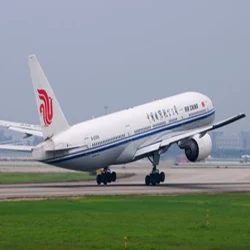Here are key aspects related to air freight
2024-01-09
Air freight, also known as air cargo, refers to the transportation of goods by aircraft. It is a crucial component of the global supply chain, providing a fast and efficient means of shipping goods across long distances. Here are key aspects related to air freight:
1. Speed and Efficiency:
- Air freight is one of the fastest modes of transportation, making it ideal for time-sensitive shipments. Goods can be delivered within a matter of hours or days, compared to the longer transit times associated with sea or ground transportation.
2. Global Connectivity:
- Air freight allows for global connectivity, enabling businesses to transport goods quickly between continents. Major airports serve as international hubs facilitating the movement of cargo worldwide.
3. Types of Cargo:
- Air freight can accommodate a wide range of cargo, including perishable goods, high-value items, electronics, pharmaceuticals, and time-sensitive shipments. However, there are limitations on the size and weight of individual items.
4. Air Cargo Infrastructure:
- Airports around the world have dedicated infrastructure for handling air cargo. This includes cargo terminals, warehouses, and specialized equipment for loading and unloading goods from aircraft.
5. Freight Forwarders:
- Freight forwarders play a crucial role in air freight logistics. They are responsible for coordinating the transportation of goods, booking cargo space on flights, handling documentation, and ensuring compliance with regulations.
6. Cargo Aircraft:
- Some aircraft are specifically designed for cargo transportation, such as freighter planes. These aircraft have large cargo holds and specialized systems for securing and transporting various types of goods.
7. Air Freight Rates:
- Air freight rates are influenced by factors such as the weight, dimensions, and nature of the cargo, as well as the distance traveled. Rates can also be affected by fuel prices, seasonal demand, and other market factors.
8. Express Air Freight Services:
- Express air freight services, offered by companies like FedEx, UPS, and DHL, provide expedited delivery options for small packages and documents. These services often include door-to-door delivery with tracking and visibility throughout the shipment's journey.
9. Customs Clearance:
- Customs clearance is an integral part of international air freight. Proper documentation, including commercial invoices, packing lists, and customs declarations, is required to ensure compliance with customs regulations in both the departure and arrival countries.
10. Security and Safety:
- Air cargo undergoes stringent security measures to prevent unauthorized access and ensure the safety of the aircraft and its occupants. Security screening procedures are in place to detect and prevent the transportation of dangerous or prohibited goods.
11. Environmental Impact:
- While air freight is fast and efficient, it also has a higher environmental impact compared to other modes of transportation. The aviation industry is exploring ways to reduce its carbon footprint through technological advancements and sustainable practices.
Air freight is a preferred choice for businesses needing rapid transit times and reliable delivery for their goods, especially when time is of the essence. However, the cost associated with air freight can be higher compared to other modes of transportation, making it essential for businesses to weigh the benefits against the expenses based on their specific logistical needs.



